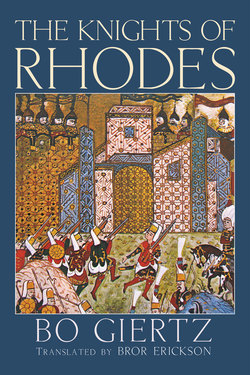Читать книгу The Knights of Rhodes - Bo Giertz - Страница 5
На сайте Литреса книга снята с продажи.
ОглавлениеTranslator’s Preface
Bo Giertz, the late beloved Bishop of Gothenburg and author of The Hammer of God, wrote this novel in 1972 long before September eleventh (coincidentally a chapter title in this book). Yet the book is written with prescient genius, tackling all the hard questions and issues confronting Christians in the west since 9/11: Can a Christian be a soldier? What is Islam? How is it different than Christianity? What is the proper response to aggression, torture, etc.? In tackling these hard questions, he writes a superb novel exposing people for who they really are.
If The Hammer of God is a narrative exposition of the distinction between Law and Gospel, then The Knights of Rhodes is a narrative exposition of the theology of the cross. Almost nothing goes right for the Knights Hospitallers. As the Ottoman Turks under Suleiman’s leadership lay siege to the Hospitallers’ little island kingdom, you see two theologies of glory clash, and the Christians lose. In the process you see the Christian characters as sinful men, adulterers, connivers, ambitious, racist, and revilers. They aren’t exactly Sunday school heroes, but they are real men, real Christians, and real heroes through whom Bo Giertz exposes the human condition raw and laid bare in the midst of war, ugly for all to see. Yet for all the ugliness, the story is sublime as Christ, the Cross, and the forgiveness of sins are brought to the fore.
Today it is common for western citizens to denounce the crusades and the crusaders as barbaric. Here you see another side. There is no hagiography here, but you see these men for all their faults as lovers of their countries and western civilization, defenders of their countrymen and faithful Christians. Perhaps you may develop a fondness for these men who gave their lives to defend, if not exactly the same values we cherish today, then the environment in which these values developed. One might say they lost. For sure they lost their city, their fame, wives, children, goods, and for many even their own lives in the face of defeat. Yet, as they fell back and retreated to Malta, these men halted or at least slowed the militant advance of Islam. Had they folded easily, the Renaissance, the Reformation, the scientific and cultural advances of the West may never have happened. Religious freedom and tolerance might not be known at all in the world, as they are still unknown in many places today. Peace and life might not be valued as much as we in the West think they ought to be.
It has been my joy to translate this book little by little over the last couple of years. I thank Birgitta and Martin Giertz for their permission to publish this translation. Thanks are also due to Laura, my wife, who has had to put up with my nose in a book for days on end. My uncle Per Olaf Eker, who tracked down the meaning of so many Swedish nautical terms and their English equivalents, deserves special thanks. The translation work would not have been done without his help. I must also thank Dr. Gene Edward Vieth, Jr. for his help in editing and revising this book. His work has made the book a much more enjoyable read. What a tedious chore it is to copy edit! I am humbled that he found this work worth the time and effort. It goes without saying that any error’s that may remain, remain my own. My congregation, First Lutheran in Tooele, Utah, you might say has been a patron of this translation also. I never exactly asked for the time to translate, but they have provided it for me nonetheless. They are a wonderful congregation—patient, loving, and generous. I am indebted to them, and so are the readers of this book.
Monday the Eighteenth week after Pentecost 2009
